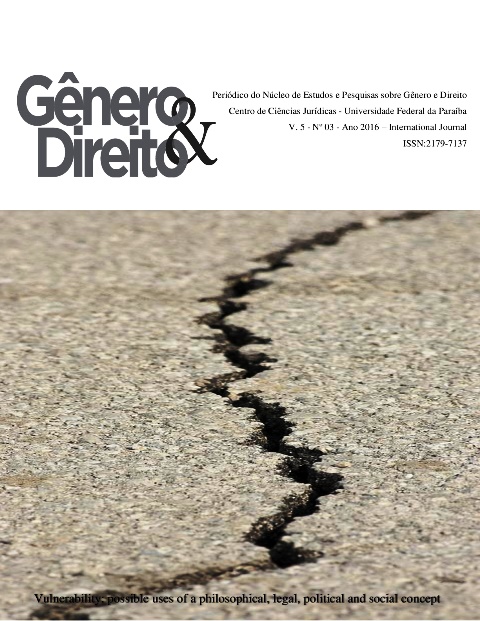BETWEEN VULNERABILITY AND CONTAMINATION: RETHINKING THE SELF IN THE GLOBAL AGE
Palavras-chave:
sovereign subject, contaminated subject, Bataille, Butler, global vulnerability.Resumo
Contemporary feminist thought undoubtedly has the merit of having called into question the paradigm of the modern subject: that is the figure of a sovereign subject. Despite immense differences, feminism has tried to rethink the subject by taking criticism of the modern paradigm as its starting point. The idea has emerged of a subject that takes leave of the modern Self’s unilateralism by reintegrating the excluded, repressed, undervalued poles (whether they are difference, the body, the unconscious or care). In other words, what has long been considered “other” loses its negative connotation and becomes an element constituting the Self. While sharing this perspective, I have come up with an idea that could be defined as the fertility of the negative. Particularly inspired by the reflection of Georges Bataille, I have tried to put forward the notion of a contaminated subject.Downloads
Referências
Bataille, Georges (1967), La Part Maudite. Précédé de La Notion de Dépense. Paris: Editions de Minuit.
Bataille, Georges (1988) Inner Experience. Albany: State University of New York Press.
Bauman, Zygmunt (1999), In Search of Politics. Cambridge: Polity Press.
Beck, Ulrich (1992), Risk Society: towards a New Modernity. London: Sage.
Benjamin, Jessica (1988), The Bonds of Love. New York: Pantheon Books.
Blanchot, Maurice (1988), The Unavowable Community, New York: Station Hill Press.
Butler, Judith (2004), Precarious Life: the powers of mourning and violence. London; New York: Verso.
Butler, Judith (2005), Giving an Account of Oneself. New York: Fordham University Press.
Cavarero, Adriana (2000), Relating Narratives: storytelling and selfhood. London: Routledge.
Cavarero, Adriana (2009), Horrorism. New York; Chichester: Columbia University Press.
Chodorow, Nancy J. (1978), The Reproduction of Mothering. Berkeley; London: University of California Press.
Esposito, Roberto (2011), Immunitas. The Protection and Negation of Life. Cambridge: Polity Press.
Giddens, Anthony (1990). The Consequences of Modernity. Cambridge: Polity Press.
Gilligan, Carol (1982), In a Different Voice. Cambridge (MA): Harvard University Press.
Harvey, David (1989), The Condition of Postmodernity. Oxford: Blackwell.
Hirschmann, Albert O. (1977), The Passions and the Interests. Princeton: Princeton University Press.
Honneth, Axel (1995), Struggle for Recognition: the moral grammar of social conflicts. Cambridge: Polity Press.
Huntington, Samuel P. (1996), The Clash of Civilizations and the Remaking of World Order. New York: Simon & Schuster.
Lévinas, Emmanuel (1981), Otherwise than Being or Beyond Essence. The Hague; London: Nijhoff.
Marramao, Giacomo (2003), Passaggio a Occidente. Turin: Bollati Boringhieri.
Nancy, Jean-Luc (2000), Being Singular Plural. Stanford: Stanford University Press.
Nussbaum, Martha (2001), Upheavals of Thought: the intelligence of emotions. Cambridge: Cambridge University Press, 2001.
Pulcini, Elena (2000), “Modernity, Love and Hidden Inequality”, in EUI Working Papers. Badia fiesolana, Florence: European University Institute.
Pulcini, Elena (2012), The Individual without Passions. Modern Individualism and the Loss of Social Bond, Lanham, USA: Lexington (Rowan & Littlefield), originally published in 2001.
Pulcini, Elena (2002), “European Feminine Identity and the Idea of Passion in Politics”, in Griffin and Braidotti (eds.), Thinking Differently. A European Women's Studies Reader. London: Zed Books: 97-109.
Pulcini, Elena (2003), Il potere di unire. Femminile, desiderio, cura. Turin: Bollati Boringhieri.
Pulcini, Elena (2006a), The Contaminated Subject: Passions, Power and Care. http://www.travellingconcepts.net.
Pulcini, Elena (2006b), “Responsibility and Care in the Global Age”, in Skaerbaek, Duhaček, Pulcini and Richter, Common Passion, Different Voices. Reflections on Citizenship and Intersubjectivity. York: Raw Nerve Books.
Pulcini, Elena (2012), Care of the World. Fear, Responsibility and Justice in the Global Age, Dordrecht: Springer.
Pulcini, Elena (2016), What Emotions motivate Care?, in “Emotions Review”, doi: 10.1177/1754073915615429
Ricoeur, Paul (2005), The Course of Recognition. Cambridge (MA): Harvard University Press.
Sen, Amartya K. (2006), Identity and Violence: the illusion of destiny. London: Allen Lane.
Simmel, Georg (1950), “The Stranger”. In The Sociology of Georg Simmel. New York: The Free Press.
Spivak, Gayatri C. (1999), Critique of Postcolonial Reason. Cambridge (MA): Harvard University Press.
Spivak, Gayatri C. (2003) Death of a Discipline. New York: Columbia University Press.
Taylor, Charles (1992), Multiculturalism and ‘the Politics of Recognition’. Princeton: Princeton University Press.

